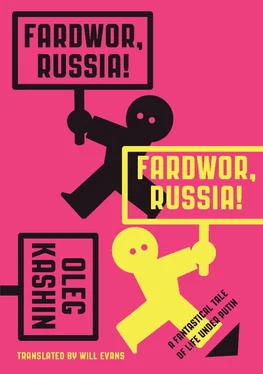They made their way to the hotel on foot. Karpov told her that the hotel had been built by Syrian workers, and one summer, on one of his regular trips to see his grandparents, there had been a cholera outbreak in the region and his parents, who had been traveling around that summer in the Baltics, ordered his grandfather to immediately buy a ticket and bring little Karpov to them. And so while his grandfather stood in line to buy the ticket, the health services office explained that the source of the outbreak were these very Syrians, who were at first quarantined in a sanitarium and then basically thrown out of the country and sent back to their homeland once and for all, which brought the construction to an abrupt halt. The hotel stood unfinished and vacant for some fifteen years until some Chechen guy bought it. Karpov told her about the Chechen and about the Dynamo Stadium where there’s a memorial plaque at the entrance honoring the Dynamo soccer team that had won the RSFSR championship back in 1949—he went on and on, displaying the fantastic volume of useless trivia that filled his head. Marina listened and suddenly realized beyond a shadow of doubt that nothing good would come of this trip, of course; Karpov’s plan wouldn’t succeed and she would have to return to Moscow alone—probably long before six months had passed.
WHEN THEY AGAIN passed the intersection by the cemetery, Karpov wasn’t as nervous as he had been the day before, but something was still going on, and he even said, “No matter where or when, you really can’t go home again;” and it took Marina a few extra seconds before she realized that this was actually a quote from a real poem, not just something that had come out rhyming accidentally. His mood that night infected her too. She had almost come to terms with this foreign-feeling place, with its tin Red Army soldier standing guard, but she couldn’t understand what sort of place this town was where she was going to have to live, and it made her nervous.
Of course they missed their turn. They went back and forth for a long time, and then, when they had finally found their way, and Karpov had dismissed the taxi driver, they spent a while standing by the door to a building’s entrance—in his childhood there hadn’t been a combination lock here, but now there was, and he didn’t know the code. They sat on a bench in front of the entrance; Karpov was again telling some story and Marina was again not listening, but then a tall skinny guy came out of the entrance with a bucket and Karpov got excited again, and calling out to the guy, Gennady (and using an intimate tone that was not typical of him when talking with strangers and people he didn’t know well), began to explain who he was and whose grandson he was. Gennady listened silently at first, then embraced him and then, not noticing Marina, dragged Karpov into the building’s entrance, and Marina followed them, then they rang and rang the doorbell of an old lady, and finally the old lady came out and also embraced Karpov and invited them for dinner, and he told her that he would come for dinner next time but that now his wife (“Oh, you’re married?”) was really tired, and so he needed the key. The old lady went off somewhere and then finally returned with the key, and then Karpov applied some incredible diplomatic skill in getting away, explaining to Gennady that he would drink with him next time. And only after these procedures did Marina find herself in a spacious, dusty apartment, one which had clearly been vacant for years. She went from room to room, stepped out onto the balcony, turned on the television (it worked), inspected the kitchen, then returned to the television and sat down in an armchair. She wondered whether she would like this place or not, and whether she could live here. She understood nothing. She closed her eyes.
The doorbell rang, Karpov opened it. In walked Gennady, who was evidently overjoyed at having new friends. Marina observed Gennady and Karpov through the door and decided not to get up and go into the other room. The neighbor had brought a three-liter bottle of milk and was saying something; Marina made no effort to catch what it was, but she understood that Gennady was congratulating Karpov for his wise decision: Moscow is hectic and uncomfortable, but here it’s nice and quiet, and the apartment was a good one—“Warm, dry, and not a single rat.”
“Well, I’m hoping to buy as much of that kind of stuff as I can here,” Marina heard him say to Gennady.
“What stuff?” their neighbor didn’t understand. “Apartments?”
“Not apartments,” her husband laughed. “Rats, of course.”
THE DAYS BECAME MONOTONOUS; there was absolutely nothing to do in the town, and it was quite stupid to drive to the city every day just to entertain themselves. Marina resigned herself to the fact that she wouldn’t be making any friends here, and was fine with it; when you can get around the whole town in fifteen minutes, any acquaintance can mutate into an intrusive, unwanted friendship. After a week, Marina went alone to have dinner with the same neighbor who had given Karpov the keys; from their first day there, Karpov had completely withdrawn into his laboratory work, which now took place not in the kitchen, as it had in Moscow, but rather in a special shack which had also been left to him by his grandfather. He didn’t invite Marina out to the shack, and she never asked to come; it wasn’t so much that she didn’t want to get in the way, she was afraid that she might find out her husband was placing unjustified expectations on something that was obvious folly. The neighbor, Auntie Katya Shustikova, turned out to be a sweet old lady who immediately told Marina everything she had already heard from Karpov—that at one time the town had been a military settlement, then Krushchev reduced the size of the army and then decided that agricultural science needed to be closer to the earth and, therefore, the Science Research Institute where Karpov’s deceased father and his Auntie Katya’s deceased husband had worked was transferred here to this boring land, and within ten years around this first building another dozen or so urban apartment buildings had popped up, entirely populated with senior and junior scientists, along with one academician from the All-Union Academy of Agricultural Science—Boris Prokopevich Goncharov, also deceased. Undoubtedly those really had been the good old days when everybody knew and loved one another, and the young obeyed their elders, and there were no drunks, and no one littered the streets; not like now, when nearly nothing remained of the institute, the bitch of a head manager was making money selling off the institute’s land, the first generation of the settlement’s inhabitants had died off, and now all sorts of outsiders living in the buildings had no clue about all of this good magic that now remained only in the form of Auntie Katya’s fond memories.
Auntie Katya, of course, was also interested in what Karpov was going to be doing, and when Marina answered that she herself didn’t know for sure, the old lady, of course, didn’t believe her, but she didn’t let on and instead talked about how Karpov’s grandfather had once been involved with something very mysterious—“petroleum growth substance,” which had actually been extracted from oil by a bunch of fraudulent Azeri Lysenkoist scientists, and his grandfather had really thought that if this petroleum product were fed to pigs then the pigs would put on weight faster than if they were fed normal food. But the pigs had a natural “human” reaction to the oil—they refused to eat it, and force-feeding led to massive deaths; and then Lysenko’s genetics project went out of fashion, the program was canceled, and Karpov’s grandfather, having come to terms with the fact that his career had been a failure, worked until retirement at the institute’s Department of Propaganda and Agitation, nursing a hatred for agriculture and any other science in any shape or form.
Читать дальше




![Stephan Orth - Behind Putin's Curtain - Friendships and Misadventures Inside Russia [aka Couchsurfing in Russia]](/books/415210/stephan-orth-behind-putin-s-curtain-friendships-a-thumb.webp)






